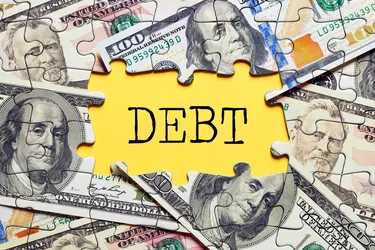
With the Consumer Price Index sitting at 8.5 percent and far above the annual two percent inflation target, higher prices are burdening Americans and leading the Federal Reserve to take action via interest rate increases. While higher interest rates can help you as a saver, they can lead to higher interest payments as a borrower. However, the severity of rate hikes will depend on whether you have a fixed- or variable-rate credit product. Understanding how the inflation rate affects debt will help you decide on your options for minimizing the effects.
Consider also: 5 Strategies for Improving Your 2022 Finances
Video of the Day
Video of the Day
To minimize the effects of higher interest rates, especially consider paying down variable-rate debt to avoid rising monthly payments and higher total interest costs.
Inflation’s Effects on Interest Rates
The pandemic had hampered GDP growth and economic activity as many people became unemployed, production slowed down and people's spending changed. When the U.S. central bank, the Fed, took action on monetary policy to set low interest rates, this helped encourage spending and economic growth. However, as the economy recovered, high inflation became an issue and your purchasing power decreased.
In response to the inflationary effects of a strong economy, the Fed decided in March 2022 to start enacting interest rate increases. The first increase was by 0.25 percentage points, but several more increases are expected this year.
What Higher Inflation Means for Debt
The Fed's actions in response to the rate of inflation mean that lenders will likely charge higher rates for taking out new debt as the rate hikes occur. In addition, you can see interest rate increases on your existing credit cards, car loans, mortgages and any other financial product with variable rates. On the other hand, you shouldn't see an increase in interest charges for fixed-rate products.
In the short term, this tightening of the money supply means you can find yourself with higher monthly debt payments if interest rates increase. This means an additional strain on your budget that worsens as rates continue to rise. In addition, you face the long-term prospect of all that interest adding up until you've paid off your debt.
Consider also: Relationship Between Interest Rate & Investment
Paying Off Your Liabilities Early
To minimize the effects of higher interest rates, especially consider paying down variable-rate debt to avoid rising monthly payments and higher total interest costs. However, even paying down fixed-rate debt now can be a good idea if you can afford to. With the rising price of goods putting a dent in your budget, your debt payments could lead to a personal budget deficit unless you experience wage increases or make cuts in other areas to offset the extra costs.
Some personal finance actions to consider include:
- Using your income tax refund to pay off high-interest debt.
- Making extra monthly payments on debt as your budget allows.
- Increasing the minimum payment you make each time.
- Looking into debt consolidation programs if they can get you a better rate and reduce the repayment period.
- Avoiding late payments since they can make your lender raise rates further.
- Using zero percent balance transfer offers carefully to move high-interest credit card debt.
Consider also: Timing Tricks for the Best Way to Pay Down Debt
Taking on New Debt
If you need a new loan or credit card, keep in mind that applying sooner rather than later can help you get a better rate before the Fed decides on further increases. You'll want to carefully compare offers from lenders since rates vary, and you'll want to choose the best offer. In addition, keep in mind that variable rates come with the risk of future increases versus fixed rates that provide stability.
You can also consider strategies for specific situations. For example, asking your lender about locking in a rate can especially be a good idea if you're planning to buy a home soon. Also, if you do end up with a higher interest rate for new debt, then you could later consider refinancing if rates eventually drop enough to make it worth any fees and hassle.
Consider also: Get Out of Debt Hack: Pay More Than the Minimum
- Consumer Financial Protection Bureau: What Is the Difference Between a Fixed-rate and Adjustable-rate Mortgage (ARM) Loan?
- U.S. Bureau of Labor Statistics: Consumer Price Index
- Federal Reserve Bank of Philadelphia: Tracking U.S. Real GDP Growth During the Pandemic
- Consumer Financial Protection Bureau: The Fed Is Raising Interest Rates. What Does That Mean for Borrowers and Savers?
- Horizon Federal Credit Union: 5 Ways To Pay Off A Loan Early
- Consumer Financial Protection Bureau: What’s a Lock-in or a Rate Lock on a Mortgage?